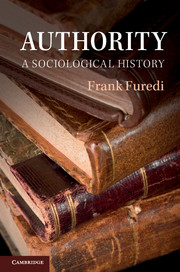Book contents
- Frontmatter
- Contents
- Preface
- Introduction: always in question
- 1 Thersites and the personification of anti-authority
- 2 Socrates and the quest for authority
- 3 Rome and the founding of authority
- 4 Augustus: a role model for authority through the ages
- 5 Medieval authority and the Investiture Contest
- 6 Medieval claim-making and the sociology of tradition
- 7 Reformation and the emergence of the problem of order
- 8 Hobbes and the problem of order
- 9 The rationalisation of authority
- 10 The limits of the authority of the rational
- 11 Taming public opinion and the quest for authority
- 12 Nineteenth-century authority on the defensive
- 13 Authority transformed into sociology's cause
- 14 The rise of negative theories of authority
- 15 By passing authority through the rationalisation of persuasion
- 16 In the shadow of authoritarianism
- Conclusion: final thoughts
- Bibliography
- Index
Conclusion: final thoughts
Published online by Cambridge University Press: 05 June 2014
- Frontmatter
- Contents
- Preface
- Introduction: always in question
- 1 Thersites and the personification of anti-authority
- 2 Socrates and the quest for authority
- 3 Rome and the founding of authority
- 4 Augustus: a role model for authority through the ages
- 5 Medieval authority and the Investiture Contest
- 6 Medieval claim-making and the sociology of tradition
- 7 Reformation and the emergence of the problem of order
- 8 Hobbes and the problem of order
- 9 The rationalisation of authority
- 10 The limits of the authority of the rational
- 11 Taming public opinion and the quest for authority
- 12 Nineteenth-century authority on the defensive
- 13 Authority transformed into sociology's cause
- 14 The rise of negative theories of authority
- 15 By passing authority through the rationalisation of persuasion
- 16 In the shadow of authoritarianism
- Conclusion: final thoughts
- Bibliography
- Index
Summary
Authority has never been entirely a taken-for-granted institution. Even during the Middle Ages, often described as an epoch of tradition and religion, competing claims to authority had a significant impact on public life. Yet the questions raised by medieval claims-makers appealed to a shared religious and cultural legacy and did not fundamentally query the authority of authority. In the centuries to follow, the range of issues subjected to competing claims has both expanded and assumed a more profound quality. Claims-making has always been a competitive enterprise; but this competition has become complicated by the fact that the authority or authorities it appeals to today are also intensely contested. Who speaks on behalf of the child or the victim? Whose account of global warming is authoritative? Those in authority look for the authorisation of others to validate their claims. Scientists and advocacy organisations seek alliances with authoritative celebrities. Governments appeal to the evidence of experts to justify their policies, as illustrated in the way that government initiatives are usually accompanied by ‘new research’ that legitimises such policies. As Giddens notes, in the absence of ‘determinant authorities’, there ‘exist plenty of claimants to authority – far more than was true of pre-modern cultures’.
The proliferation of competing claims-making is a symptom of the difficulty that society has in elaborating a shared narrative of validation. Historically, the question of how to validate and give meaning to authority has been posed and answered in different ways. The contrast between the explicit assertion of auctoritas by Augustus or Pope Gregory, and the current tendency to evade the question, highlights the transformation of the workings of authority over the centuries. The last historical moment that there was an explicit attempt to recover and assert a politicised conception of foundation for authority – the inter-war era of the 1920s and 1930s – led to its ‘revival’ in the caricatured form of authoritarianism. The experience of these decades continues to haunt discussions of authority, and shape the way that it is conceptualised in public life.
- Type
- Chapter
- Information
- AuthorityA Sociological History, pp. 403 - 409Publisher: Cambridge University PressPrint publication year: 2013



